Have you ever found yourself in a conversation where the terms "network marketing" and "direct selling" are tossed around as if they're one and the same, leaving you scratching your head in confusion? You're not alone. The overlap in these terms often leads to a blend of understanding, making it challenging to distinguish one from the other. But fear not. It's common to find these terms mixed up, but this article aims to clear up any confusion and make understanding these concepts simpler.
Let's start with the basics. Direct selling is a straightforward business model where products and services are marketed and sold directly to consumers, sidestepping traditional retail outlets. It eschews the traditional retail pathway, opting instead for a more personal touch. It's a model that offers a launchpad for entrepreneurs to start and grow their businesses with minimal startup and overhead costs. Direct selling is centered on flexibility, building strong customer relationships, and giving individuals the freedom to work independently, set their own schedules, and develop their marketing strategies.
What is direct selling?
Direct selling operates as a straightforward business approach, wherein products and services are directly marketed and sold to consumers, bypassing the conventional retail channels. This model avoids traditional retail methods, favoring a more personalized interaction instead.
What is network marketing?
In network marketing, independent agents not only endorse and sell products or services but are also encouraged to enlist and mentor additional representatives, creating a multi-level marketing framework. This method is often referred to as referral marketing.
Transitioning from the individual-centric model of direct selling, we have network marketing that takes the principles of direct selling and adds a layer of community building. In this model, independent representatives not only promote and sell products or services but are also motivated to recruit and train more agents, forming a multi-level marketing structure (MLM). This approach is sometimes known as referral marketing. What sets network marketing apart is the way agents earn commissions: not just on their personal sales but also from the sales made by the agents they've brought into the fold, extending through multiple levels. It's crucial to understand that network marketing is distinct from pyramid schemes, which focus on recruitment without a genuine product or service at their core.
With these definitions laid out, we're ready to explore each concept further. Our goal is to provide you with a clear understanding of network marketing and direct selling, so you can make an informed decision about which might suit your needs best.
Income Structure
Ever wondered how people actually make money in direct selling versus network marketing? It's all about the way cash flows, and trust me, it's pretty interesting once you break it down.
Think of direct selling as your classic storefront but without the actual store. You've got products or services, and you sell them straight to folks who want them. Start with your buddies, your family, or that neighbor who's always keen on the latest gadgets. The more you sell, the more you pocket. It's straightforward, with commissions tied directly to your sales. No fuss, just sales and earnings. Perfect for those who love the hustle of selling and want to see the fruits of their labor without any complications.
Now, network marketing, or MLM, as it's often called, adds a twist to the tale. Here, you're not just selling; you're building your mini empire. You sell stuff, sure, but the real game-changer is when you start bringing others into the fold to sell too. You get a piece of their pie, and if they bring in more people, you get a slice of that too. It's like having a team where everyone's sales put a little in your pocket. This setup can lead to a sweet stream of passive income, especially as your network grows by applying effective network marketing tips and strategies. It's a bit like planting a tree and watching it bear fruit.
So, what's the catch?
Direct selling is focused on keeping it simple and focusing on the sale. The downside? You're doing all the legwork. With network marketing, the potential to earn from your downline's efforts is tempting, but remember, it's not just about your sales anymore. You've got to be a bit of a leader, coaching your team and helping them succeed.
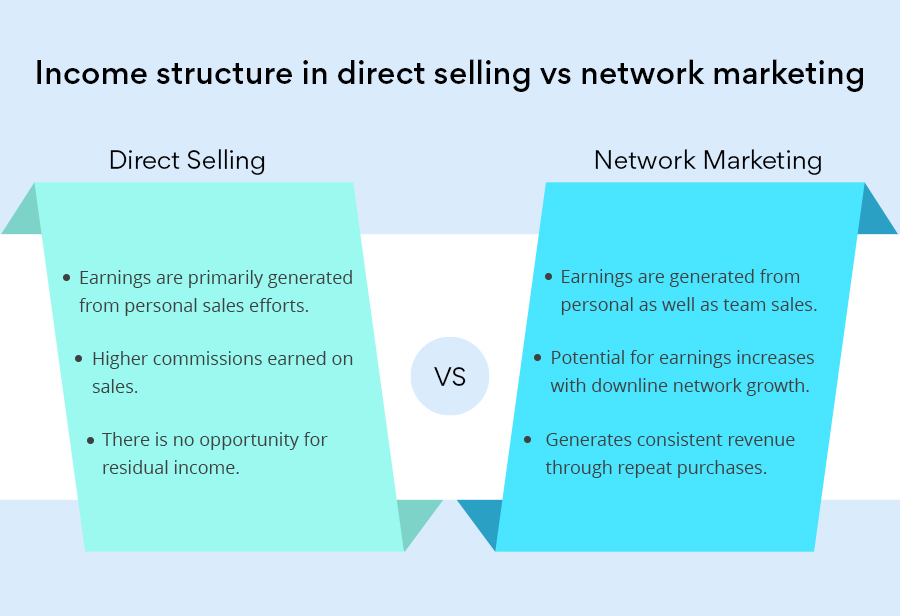
At the end of the day, it boils down to what suits you best. Love the straightforward, solo approach of just selling and earning? Direct selling could be your jam. Or maybe you're into the idea of building a network and reaping rewards from collective efforts? Then network marketing might just be your thing.
Product Focus
When we talk about making a mark in the world of direct selling and network marketing, it all boils down to what you're selling and how you're selling it. Both of these paths have their own playbook when it comes to products, and understanding this can make a significant difference.
Direct selling is like that neighborhood pop-up shop that brings a variety of goods right to your doorstep, from the latest in skincare to the newest kitchen gadget. Companies thriving in this space have nailed the art of selling consumables—stuff we use up and need to replace, like cosmetics and household cleaners. These items aren't just easy on the wallet to produce but also keep customers coming back for more, ensuring a steady flow of sales.
Network marketing takes the direct selling vibe and kicks it up a notch. Yes, it's about moving products, from wellness supplements to beauty essentials, but there's a twist—building your sales squad. This setup isn't just about what's sold but also about growing a team that can sell too, creating this ripple effect where everyone's in on the action. The trick? Focusing on items that folks need over and over, keeping the cycle of sales active.
Now, direct selling is pretty straightforward, but it's all on you. And let's not overlook the reality that not all direct selling opportunities are created equal—some have gotten a bad rap for not playing fair.
On the flip side, network marketing offers the allure of earning from your team's efforts, but it's not all smooth sailing. The push to build a team can sometimes overshadow the actual products, leading to a shaky foundation that's hard to sustain. Plus, there's that nagging association with pyramid schemes, even though legit MLMs are dedicated to selling real, tangible products.
Focusing on the product aspect, making a choice between direct selling and network marketing boils down to understanding the nuances of what's being offered and how. If your passion lies in showcasing a variety of tangible goods, often seen in direct selling, where the value is clear and the transactions are straightforward, this could be your destination. It's about being the go-to person for high-quality items, guiding customers through their purchases with expertise and personal insights.
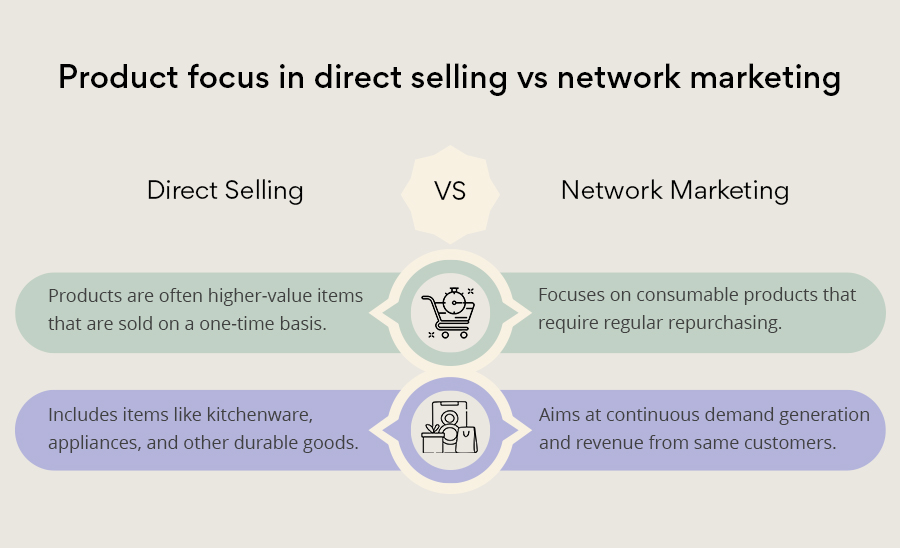
Conversely, if you're drawn to the idea of repeat business, where consumable products keep the sales cycle active and engaging, network marketing might be your forte. Here, it's not just about the sale; it's about fostering lasting customer relationships and building a community around a product line that becomes a staple in people's lives.
Growth Potential
In the world of direct selling, you run the show. It's all about setting your own schedule, finding that sweet spot between work and life, and going at your own pace. This model isn't just about making sales; it's a chance for personal growth, expanding your circle, and upping your income through your own hustle. The catch? Your success leans heavily on the connections you make, the trust you build, and the top-notch service you provide. It's personal, it's direct, and your growth is directly tied to how much you're willing to put in.
Switch gears to network marketing, and you're looking at growth in 3D. Here, it's not just what you sell—it's also about the team you build. With every recruit that joins your ranks, your potential for passive income gets a boost. This model centers on scaling up, and creating a network that works with you, and for you. It's a collective push towards growth, where your leadership and ability to nurture your team's skills can skyrocket your success. But remember, with great power comes great responsibility—managing a growing team and keeping the momentum going is part of the deal.
It's not all smooth sailing, though. Direct selling can sometimes feel like a solo journey with fluctuating income, depending heavily on your ability to engage and sell. Meanwhile, network marketing's lure of passive income comes with its own set of hurdles, like the pressure of constant recruitment and the risk of market saturation that could test your relationships.
It bears emphasizing that a powerful network marketing software can fuel the expansion of your entrepreneurial growth. These comprehensive platforms act as command centers for your network marketing success. Features like CRM allow you to track prospects, manage customer relationships, and tailor your outreach for maximum impact. Marketing automation tools that come along with these direct selling software, do the hard work for you, allowing you to plan campaigns, evaluate performance data, and constantly refine your approaches.
Discover how we build resilient businesses with advanced MLM functionalities
Additionally, distributor training modules and skill development programs empower you to elevate your salesforce's capabilities continuously. With all these solid features together in one place, you've got everything you need to build a successful network, develop skills, and greatly increase your odds of seeing major growth.
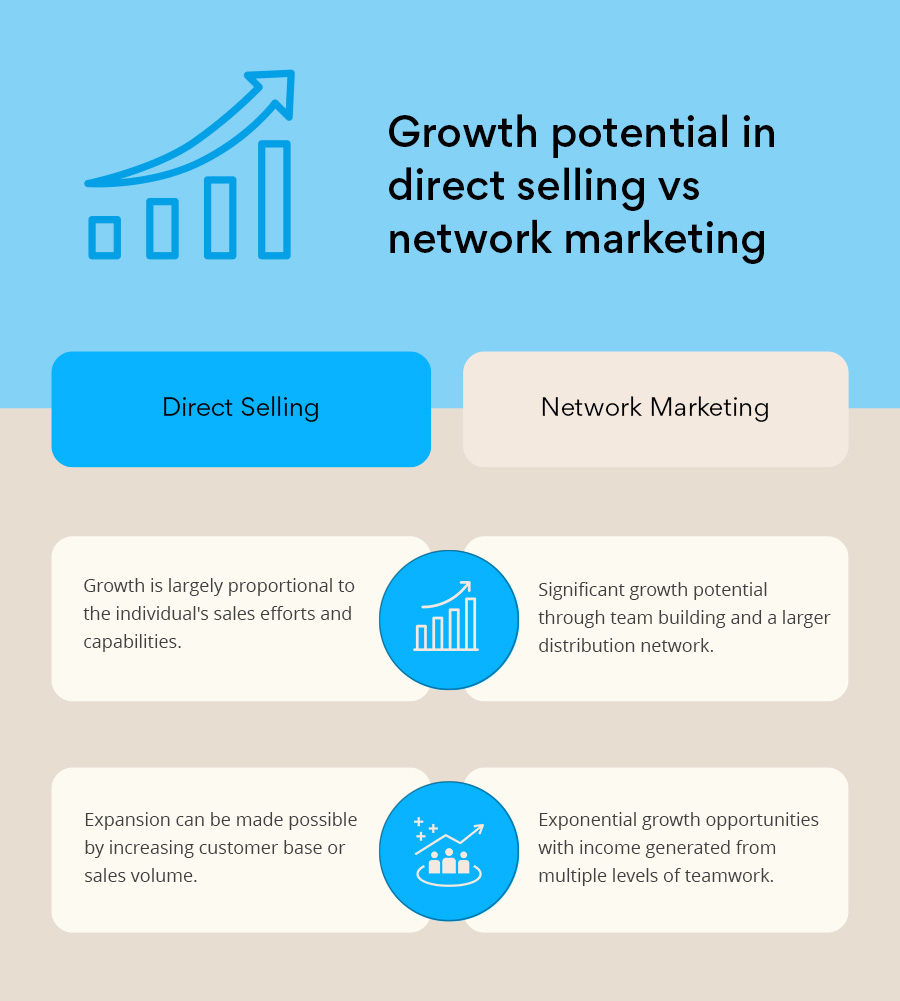
So, what's it going to be? If the idea of a straightforward selling gig, powered by your own sales prowess, sounds like your kind of challenge, direct selling could be your arena. But if you're drawn to the idea of building something bigger, leveraging a network for broader growth, and you're up for the dynamics of team building, network marketing might just be your calling.
Sales Approach
Direct selling excels at creating memorable, one-on-one customer experiences. This world thrives on those face-to-face moments, whether it's over a cup of coffee at a friend's kitchen table or a casual meet-up at a local cafe. What sets direct selling apart is the personalized touch—understanding a customer's unique needs and offering just the right solution. With the advent of digital tools, direct sellers are not just stopping at personal meetings; they're also using social media to keep the conversation going, ensuring they're just a message away from providing that next personalized recommendation. It's this combination of traditional and digital that's keeping direct selling vibrant and effective.
Network marketing takes the essence of direct sales and uplifts it with the power of community. Here, it's not just about selling a product; it's about mentoring the next wave of sales enthusiasts. This model thrives on digital platforms, not only for product promotion but also for building and nurturing a team. Through webinars, social media groups, and online training sessions, network marketing professionals cultivate a culture of learning and growth. It's this commitment to mentorship and support that empowers each team member, encouraging them to reach their full potential, both as individuals and as part of the collective.
While digital integration has opened new doors for both direct selling and network marketing, it comes with its own set of challenges. Keeping digital interactions personal and maintaining the human touch online can be a fine line to walk. Additionally, the mentorship aspect of network marketing demands a significant investment of time and resources to truly develop effective leaders within the network.
Direct selling might feel like a solo journey where your growth is influenced by the people you know and the community you're part of. It's about carving out your niche in familiar territories, where the depth of your personal network can sometimes define the height of your success. On the other hand, network marketing opens up broader horizons, inviting you to leap into new markets with every team member you welcome aboard. This model offers a path to scale far and wide, with a watchful eye on market demands to avoid stretching too thin.
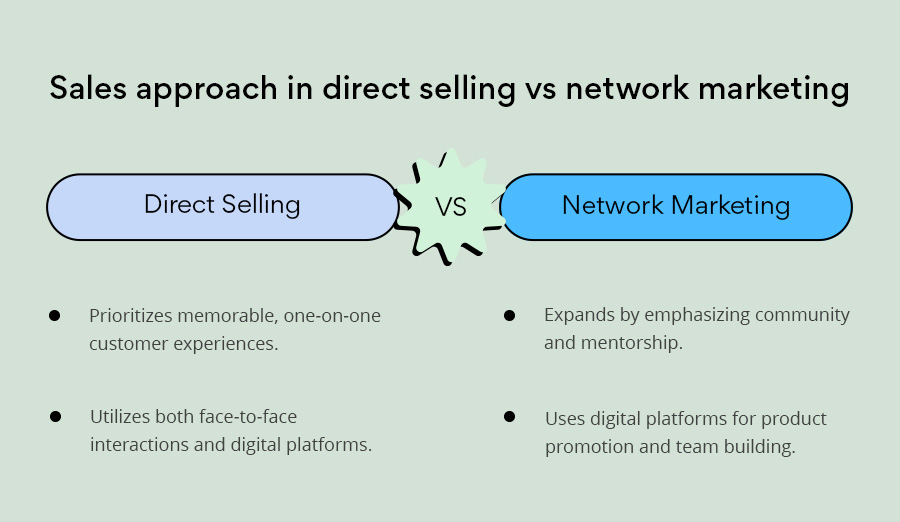
In choosing your path, it's about weighing the scale of your ambition against the scope of your network, ensuring your venture not only matches your personal sales style but also aligns with the market's pulse.
Legal Ground Rules: Direct Selling vs. Network Marketing
Direct selling is all about keeping things clear and above board. It's not just about what you're selling but also about how you're selling it. The law demands transparency in every deal, ensuring customers know what they're buying and that they're getting it at a fair price. For direct sellers, this means sticking to the rules, from making sure your sales pitches are straight-up to handling refunds like a pro when things don't go as planned. Whether it's ensuring the quality of what you're selling or being upfront about any earnings claims, keeping your business practices transparent is key.
Network marketing adds a layer of complexity with its multi-tiered structure. It's not just selling; it's about building a network that sells. This model is under the microscope to ensure it stays on the right side of the legal line, steering clear of pyramid scheme territory. The focus is on real sales to real customers, keeping the network healthy, ethical, and growing in the right way. Ensure that while you're growing your network, you're also keeping things ethical and making sure everyone is winning because of the products they sell, not just the recruits they bring in.
Both models face their fair share of legal hurdles. Direct sellers need to keep their business practices crystal clear, while network marketers have to balance recruitment with genuine sales. It hinges on maintaining integrity, ensuring your venture not only starts strong but stays strong, grounded in solid, ethical practices.
When it comes down to picking a path, understanding the legal ins and outs is key. Whether you're drawn to the straightforward sales model of direct selling or the dynamic, team-oriented world of network marketing, getting to grips with the legal requirements is a must. It means doing your homework, understanding what's expected of you in terms of legal compliance, and making sure the company you're with is playing by the rules too.
Market Reach and Distribution
Exploring the market reach and distribution strategies in direct selling versus network marketing reveals nuanced differences that extend beyond the basic contrast between individual-centric and team-focused approaches. Both models operate at the end of the distribution chain to influence customer purchase decisions, but they differ significantly in their methods and outcomes.
In direct selling, the approach to market reach is more localized and personal. Representatives engage directly with consumers, often through face-to-face interactions, personal demonstrations, or home parties. This model relies on direct sellers to adapt quickly to market trends based on customer feedback, emphasizing the importance of personal relationships and one-to-one interactions. Large companies using direct selling deploy comprehensive distribution methods to market products across vast regions, with salespeople focusing on specific areas based on their availability and time. However, this method might limit the scale of market reach due to its reliance on the direct seller's personal network and capacity to engage customers one-on-one. Direct selling businesses thrive on the entrepreneur's ability to personally connect with the market, but expanding beyond immediate networks can pose challenges.
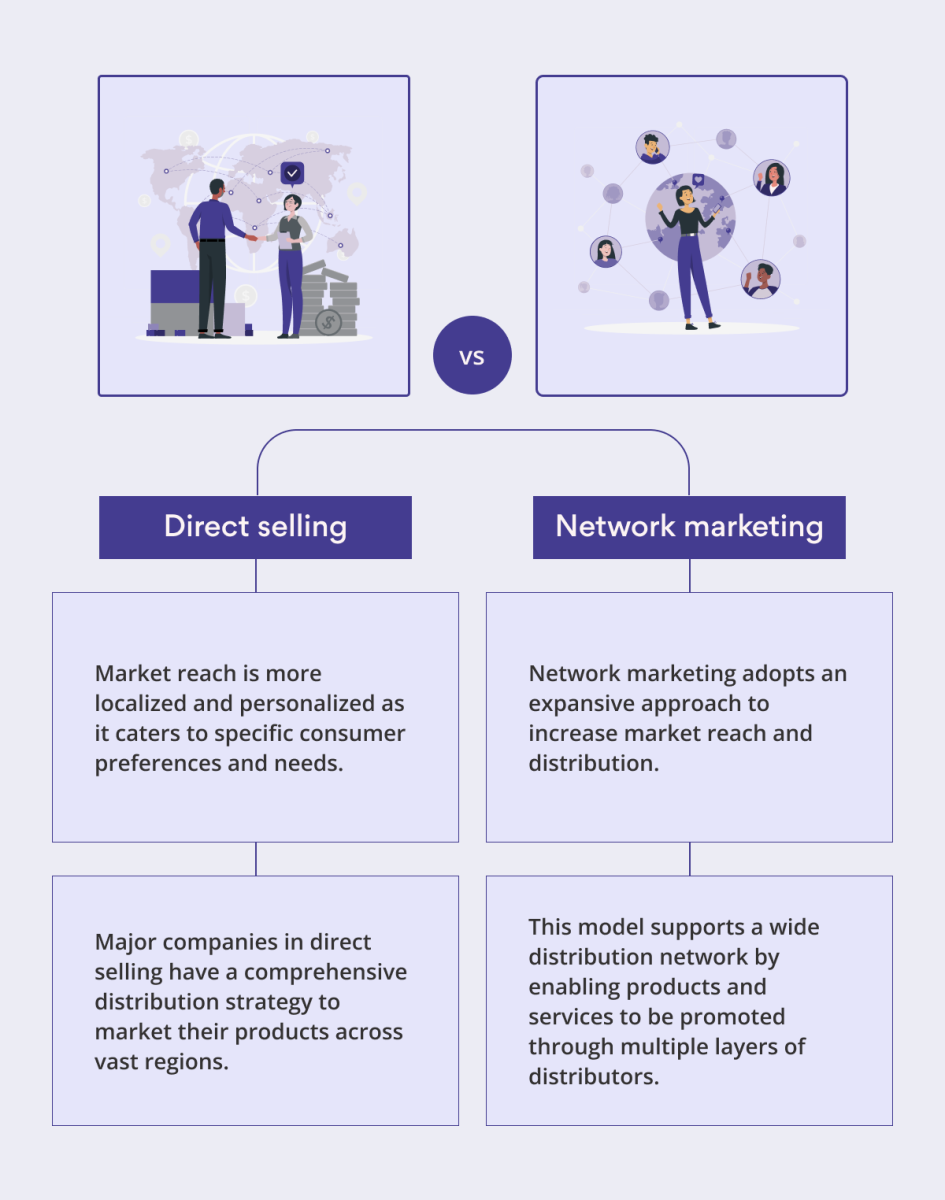
In contrast, network marketing leverages a broader strategy for market reach and distribution. By building a network of distributors, each with their own connections, the market reach in network marketing can expand exponentially. This model facilitates a wider distribution as each new member brings their personal network into the fold, potentially reaching customers across diverse geographic regions. This creates a scenario where individuals can potentially earn as much as an average monthly salary, contingent on the growth and productivity of their network. The structure of network marketing allows for a more extensive distribution network, as products and services can be marketed through multiple levels of distributors. However, this expansive reach requires maintaining consistent quality and message across a wider array of sales representatives, which can be challenging to manage.
Both models share common benefits, such as the flexibility of working from home and setting one's schedule, but they also present unique challenges. Direct selling provides a more personalized approach but may face limitations in scaling. Meanwhile, network marketing offers extensive reach through its network but needs careful management to maintain consistency and quality across its distribution channels. Network marketing might suit individuals with strong leadership skills and an interest in coaching others to succeed, despite potentially earning lower commissions on personal sales.
Wrapping it up
As we conclude our exploration into direct selling and network marketing, it's time to consider how you might move forward and carve out a fulfilling career within these dynamic fields. Both avenues offer unique opportunities to shape your professional journey, whether through the intimate, personalized interactions of direct selling or the community-driven, expansive reach of network marketing.
Choosing the path that's right for you involves more than just a surface-level assessment of each model's characteristics. It requires a deep dive into your own goals, skills, and the kind of impact you wish to make. This will set the stage for a stable career grounded in a judiciously selected domain, powered by strong research.
Making this decision is a pivotal moment in your career. It's not just about selecting a job; it's about aligning your work with your values, aspirations, and the lifestyle you envision. Both direct selling and network marketing offer the freedom to design your schedule and the potential for financial independence. However, each path demands a different set of commitments, from the hands-on sales approach of direct selling to the mentorship and team development focus of network marketing.









Leave your comment
Fill up and remark your valuable comment.